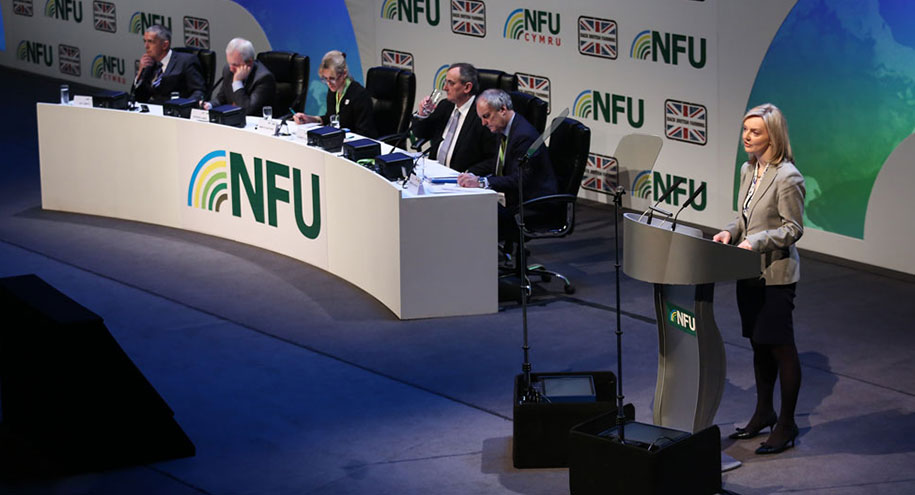
Defra Secretary Elizabeth Truss says the Government is putting more money into defending against diseases like avian influenza.
At the annual NFU conference in Birmingham the Secretary of State for Environment, Food and Rural Affairs was questioned by the Ranger about AI and its threat to the poultry sector.
There have been four outbreaks in the United Kingdom in just over 12 months, in Yorkshire, Hampshire, Lancashire and Fife in Scotland, although each one has been successfully contained – unlike the United States, where 43 million hens and seven million turkeys were lost when AI spread through more than 20 different states. There have also been widespread outbreaks in France in recent months.
The Ranger asked the Secretary of State how protection could be maintained against bird flu when Government budgets were being cut. She said that dealing with animal diseases like avian influenza had been identified as a priority for spending.
“When we have had cases here we have had a Government vet on the premises that day taking immediate action. That is why we have been able to deal with those cases rapidly. And if you look at Defra’s capital settlement, we are doubling the amount that we invest in animal disease response capability because we think it is such an important priority, along with increasing our investment in flood defences, which is the other major natural risk we face. It is an area we take very seriously, both in making sure that we have those facilities available but also making sure that we have vets on the ground when something does happen.”
At a poultry outbreak session during the conference, one farmer asked whether the industry needed to increase its defences against bird flu because of an increase in the number of birds in free range production. Industry representatives said that work was being done to improve protection, although there was no evidence that bird flu was more likely to strike in free range production units.
Bio-security requirements
Duncan Priestner, chairman of the NFU Poultry Board said that bio-security requirements were being increased under the Lion scheme. Mark Williams, chief executive of the British Egg Industry Council (BEIC), which runs the Lion scheme, said, “If you look at the history of AI outbreaks, most of the outbreaks have been in housed birds. Free range has been no greater threat,” he said.
The worst of the recent outbreaks in the UK was at Staveley’s Eggs near Preston in Lancashire. The 200,000 birds lost in the outbreak were a mixture of cage and free range layers. The other three outbreaks were all amongst housed birds.
One of the developments over recent months has been the growing availability of insurance to cover outbreaks of bird flu – particularly the secondary cleansing and disinfection costs, which have to be borne by the farmer and which have been much greater than anyone expected. The cost of the clean-up at Staveley’s Eggs was half a million pounds; the cost of the outbreak overall was a million pounds.
The British Free Range Egg Producers Association (BFREPA) launched its own ground-breaking insurance scheme at the turn of the year in a deal clinched with the broker Scrutton Bland. The agreement with Scrutton Bland provides the association with a total of one million pounds in cover over a year. Claims will be limited to £50,000 per member and the insurance will cover up to 20 members during the year.
Thompson & Richardson is another insurer that is providing bird flu cover. NFU Mutual recently joined the other insurers, launching its own policy.
Poultry sector success
In a question and answer session with the press during the NFU conference, NFU president Meurig Raymond said that the poultry sector was one of the successes of the UK farming industry and needed to be protected.
“There has been agreement right across the industry in the last number of weeks where insurance companies have become involved. There has been a cross agency, cross Government, cross industry agreement on cleaning up after an avian influenza outbreak because that has been a big issue. It can take weeks and weeks. That has slowed down the ability to get back into the export market. I am delighted to say that the industry has come to agreement with insurance companies. Let us hope we don’t end up in the situation where we have that huge disease risk overhanging the industry in the weeks and months ahead.”
During the poultry break-out session at the conference industry representatives were asked what would happen with insurance policies if there were to be multiple outbreaks in the UK as in some other countries. Gary Ford, the NFU’s chief poultry adviser said that the NFU Mutual would probably suspend giving cover to new customers for a period if multiple outbreaks were to occur.
The most recent outbreak in the UK was in January near Dunfermline in Scotland. Some 40,000 birds were involved in the case, which was on a broiler breeder unit. The outbreak was identified as a low pathogenic case of the H5N1 strain of the bird flu virus. Following the widespread outbreaks in the United States last year, another case of bird flu has been reported in the US this year. There have also been numerous outbreaks across a number of districts in France this year.
